Weathering of rocks and soil formation -> physics
Physics
Physics is the branch of science that deals with the study of matter, energy, and the interactions between them. It encompasses a wide range of topics including mechanics, thermodynamics, electricity, magnetism, and optics.
Key Concepts in Physics
- Mechanics: The study of motion and forces, including topics such as Newton's laws of motion, momentum, and energy.
- Thermodynamics: The study of heat, temperature, and energy transfer, including concepts such as the laws of thermodynamics and the behavior of gases.
- Electricity and Magnetism: The study of electric and magnetic fields, circuits, and electromagnetic radiation.
- Optics: The study of light and its interactions with matter, including topics such as reflection, refraction, and the behavior of lenses.
- Modern Physics: The study of topics such as quantum mechanics, relativity, and nuclear physics.
Study Tips for Physics
- Understand the Fundamentals: Physics builds on fundamental concepts such as force, energy, and motion. Take the time to understand these basic principles before moving on to more complex topics.
- Practice Problem-Solving: Physics is a problem-solving discipline. Practice solving problems related to the concepts you are learning to reinforce your understanding.
- Use Visual Aids: Physics often involves visualizing concepts such as motion, waves, and electromagnetic fields. Use diagrams, animations, and simulations to aid your understanding.
- Seek Help When Needed: If you encounter difficulties with a particular topic, don't hesitate to seek help from your teacher, tutor, or classmates.
- Apply the Concepts: Look for real-world examples of physics concepts in action. This can help you see the relevance and application of what you are learning.
Conclusion
Physics is a fascinating and diverse field of study that encompasses many fundamental principles of the natural world. By understanding key concepts and applying effective study strategies, you can develop a strong foundation in physics and appreciate its relevance in everyday life.
.◂Science Worksheets and Study Guides Seventh Grade. Weathering of rocks and soil formation
Study Guide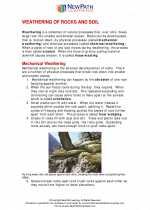 Weathering of rocks and soil formation
Weathering of rocks and soil formation  Activity Lesson
Activity Lesson Weathering of Rocks
Weathering of Rocks  Worksheet/Answer key
Worksheet/Answer key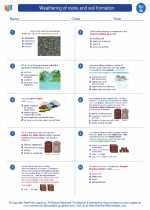 Weathering of rocks and soil formation
Weathering of rocks and soil formation  Worksheet/Answer key
Worksheet/Answer key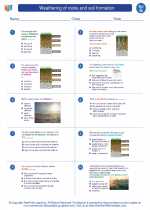 Weathering of rocks and soil formation
Weathering of rocks and soil formation  Worksheet/Answer key
Worksheet/Answer key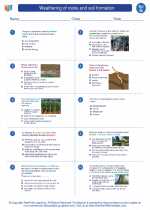 Weathering of rocks and soil formation
Weathering of rocks and soil formation  Worksheet/Answer key
Worksheet/Answer key Weathering of rocks and soil formation
Weathering of rocks and soil formation  Vocabulary/Answer key
Vocabulary/Answer key Weathering of rocks and soil formation
Weathering of rocks and soil formation  Vocabulary/Answer key
Vocabulary/Answer key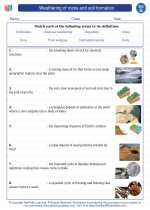 Weathering of rocks and soil formation
Weathering of rocks and soil formation  Vocabulary/Answer key
Vocabulary/Answer key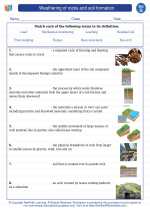 Weathering of rocks and soil formation
Weathering of rocks and soil formation  Vocabulary/Answer key
Vocabulary/Answer key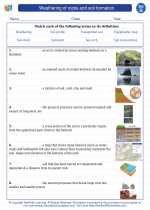 Weathering of rocks and soil formation
Weathering of rocks and soil formation 

 Activity Lesson
Activity Lesson
 Worksheet/Answer key
Worksheet/Answer key
 Worksheet/Answer key
Worksheet/Answer key
 Worksheet/Answer key
Worksheet/Answer key
 Worksheet/Answer key
Worksheet/Answer key
 Vocabulary/Answer key
Vocabulary/Answer key
 Vocabulary/Answer key
Vocabulary/Answer key
 Vocabulary/Answer key
Vocabulary/Answer key
 Vocabulary/Answer key
Vocabulary/Answer key

The resources above cover the following skills:
LIFE SCIENCE
Unity and Diversity
Analyze and interpret data for patterns of change in anatomical structures of organisms using the fossil record and the chronological order of fossil appearance in rock layers.